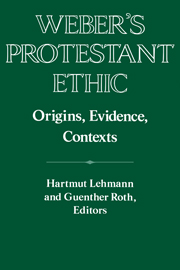Book contents
- Frontmatter
- Introduction
- Part I Background and Context
- 1 The German Theological Sources and Protestant Church Politics
- 2 The Thesis before Weber: An Archaeology
- 3 Max Weber, Protestantism, and the Debate around 1900
- 4 Weber the Would-Be Englishman: Anglophilia and Family History
- 5 Weber's Historical Concept of National Identity
- 6 Nietzsche's Monastery for Freer Spirits and Weber's Sect
- 7 Weber's Ascetic Practices of the Self
- 8 The Protestant Ethic versus the “New Ethic”
- 9 The Rise of Capitalism: Weber versus Sombart
- Part II Reception and Response
- Index
5 - Weber's Historical Concept of National Identity
Published online by Cambridge University Press: 05 January 2013
- Frontmatter
- Introduction
- Part I Background and Context
- 1 The German Theological Sources and Protestant Church Politics
- 2 The Thesis before Weber: An Archaeology
- 3 Max Weber, Protestantism, and the Debate around 1900
- 4 Weber the Would-Be Englishman: Anglophilia and Family History
- 5 Weber's Historical Concept of National Identity
- 6 Nietzsche's Monastery for Freer Spirits and Weber's Sect
- 7 Weber's Ascetic Practices of the Self
- 8 The Protestant Ethic versus the “New Ethic”
- 9 The Rise of Capitalism: Weber versus Sombart
- Part II Reception and Response
- Index
Summary
Max Weber was a vehement nationalist all his public life, from his Freiburg Inaugural Address and other writings of the 1890s to his political speeches of the First World War. I wish to explore a paradox that emerges from his scholarly writings, above all The Protestant Ethic and the Spirit of Capitalism: The advocate of German political and cultural hegemony radically undermined his era's conventional definitions of nationhood. Neither linguistic nor ethnic nor racial categories had more than marginal significance for Weber's understanding of national identity, which he defined in critical opposition to them.
National identity is not a major theme in The Protestant Ethic, which is, after all, primarily an essay on religion and economics. Yet in the course of asserting the historical significance of religion, Weber compares it to other possible determinants of culture, and one of the foremost candidates in the minds of his contemporaries was national identity. When Weber compares Puritanism and Lutheranism in his chapter on Luther and the concept of the calling, he opens up the possibility that the contrast between his examples of Milton's Paradise Lost and the chorales of Martin Luther and Paul Gerhard is just an expression of differences between English and German temperament.
- Type
- Chapter
- Information
- Weber's Protestant EthicOrigins, Evidence, Contexts, pp. 123 - 132Publisher: Cambridge University PressPrint publication year: 1993
- 2
- Cited by

